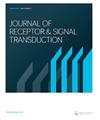选择性甲状腺激素受体激动剂GC-1在同基因小鼠模型中能够抑制结直肠肿瘤的生长
IF 2.3
4区 生物学
Q3 BIOCHEMISTRY & MOLECULAR BIOLOGY
Journal of Receptors and Signal Transduction
Pub Date : 2022-04-27
DOI:10.1080/10799893.2022.2032748
引用次数: 2
摘要
【摘要】目的甲状腺激素(TH)对癌症的作用早在100多年前就被提出;然而,结论是相互矛盾的。这是在组织和细胞水平上精确调节的。这一规律似乎在癌症中发生了改变。甲状腺激素受体β (TRβ)在许多癌细胞中具有抗增殖和肿瘤抑制作用。因此,我们决定在结直肠癌(CRC)和结肠细胞系的同基因小鼠模型中研究甲状腺激素受体β (THRB)的表达和选择性激动剂GC-1对肿瘤生长的激活。方法采用MTT法测定体外细胞活力,PI染色法测定细胞周期,FACS法测定体外细胞活力。体内肿瘤生长测量采用卡尺和[18F]氟-2-脱氧-2-d -葡萄糖(FDG) - PET成像进行。采用定量pcr检测基因表达。结果某些浓度的GC-1对结直肠癌细胞株的细胞活力有明显的负面影响。细胞周期分析表明GC-1的抗增殖作用可能不是由细胞周期阻滞或细胞凋亡引起的。结直肠肿瘤小鼠的肿瘤生长分析表明,GC-1治疗8 d可显著抑制肿瘤生长和18FDG的摄取。小鼠肿瘤中THRB表达降低;然而,GC-1处理后表达上调。结论GC-1特异性激活TRβ可抑制结直肠癌小鼠肿瘤生长,恢复其基因表达。本文章由计算机程序翻译,如有差异,请以英文原文为准。
Selective thyroid hormone receptor beta agonist, GC-1, is capable to reduce growth of colorectal tumor in syngeneic mouse models
Abstract Objective The effect of thyroid hormone (TH) on cancers was proposed more than 100 years ago; however, conclusions are conflicting. THs are precisely regulated at tissue and cellular levels. It seems that this regulation is altered in cancers. Thyroid hormone receptor beta (TRβ) has anti-proliferative and tumor-suppressive effects in many cancer cells. Therefore, we decided to investigate thyroid hormone receptor beta (THRB) expression and activation by the selective agonist, GC-1, on tumor growth in a syngeneic mouse model of colorectal cancer (CRC) and colon cell lines. Methods In vitro cell viability assay using MTT analysis, cell cycle analysis by PI staining, and FACS analysis were performed. In vivo tumor growth measurements were carried out by caliper and [18F] Fluoro-2-deoxy-2-D-glucose (FDG) – PET imaging. Gene expressions were determined using quantitative-PCR. Results Some concentrations of GC-1 had a marked negative effect on the cell viability of colorectal cell lines. Cell cycle analysis showed that the anti-proliferative effect of GC-1 may not result from cell cycle arrest or apoptosis. Tumor growth analysis in mice harboring colorectal tumor showed that GC-1 treatment for 8 d profoundly inhibited tumor growth and 18FDG uptake. THRB expression was decreased in mice tumor; however, it was upregulated following GC-1 administration. Conclusions Our results showed that specific activation of TRβ by GC-1 had negative effect on tumor growth and restored its gene expression in tumors of CRC mice model.
求助全文
通过发布文献求助,成功后即可免费获取论文全文。
去求助
来源期刊

Journal of Receptors and Signal Transduction
生物-生化与分子生物学
CiteScore
6.60
自引率
0.00%
发文量
19
审稿时长
>12 weeks
期刊介绍:
Journal of Receptors and Signal Tranduction is included in the following abstracting and indexing services:
BIOBASE; Biochemistry and Biophysics Citation Index; Biological Abstracts; BIOSIS Full Coverage Shared; BIOSIS Previews; Biotechnology Abstracts; Current Contents/Life Sciences; Derwent Chimera; Derwent Drug File; EMBASE; EMBIOLOGY; Journal Citation Reports/ Science Edition; PubMed/MedLine; Science Citation Index; SciSearch; SCOPUS; SIIC.
 求助内容:
求助内容: 应助结果提醒方式:
应助结果提醒方式:


